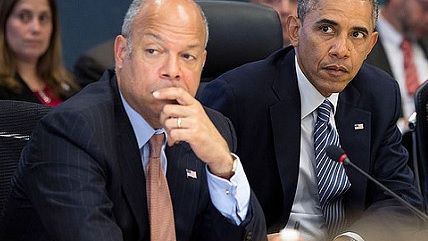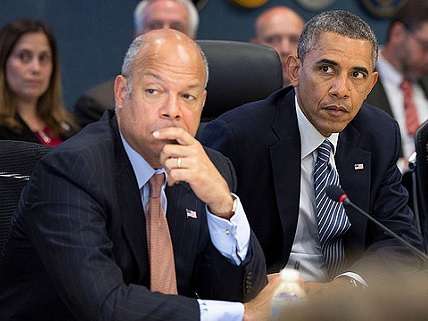Department of Homeland Security
Has Homeland Security Secretary Jeh Johnson Forgotten About Paris or Kenya or the Second Amendment?
More ignorance from the anti-gun left.


In the continued effort to use the Orlando shooting to push through new gun control legislation, Homeland Security Jeh Johnson declared that after Orlando gun control has become a "a part of homeland security," even as the shooter in Orlando was an employee of a security firm that's been one of the largest recipients of Homeland Security contracts*.
"We need to do something to minimize the opportunity for terrorists to get a gun in this country," Johnson said.
But countries with stricter gun control laws than in the U.S. are struggling to find something to do to keep guns out of the hands of terrorists too. In Europe, while it may be far harder for law-abiding residents to acquire legal firearms, terrorists are able to acquire actual "weapons of war," automatic weapons, that have are largely banned in the U.S. despite the misleading rhetoric used by the anti-gun left. Neither were tough gun laws able to stop the 2013 radical Islamist attack on the Westgate shopping mall in Kenya or the 2015 attack on Garissa University in Kenya or numerous other terrorist attacks around the world.
If the concern is radical Islamist terrorism, gun control appears more ineffective than usual. It would also be interesting to know why the Obama administration didn't deploy this argument after the 2009 Fort Hood shooting or the 2015 San Bernardino shooting. The Fort Hood shooter was a member of the U.S. military, so could access legal firearms even if guns were otherwise banned in the U.S., while the San Bernardino shooter, also a government employee, acquired his weapons legally in a state, California, with some of the strictest anti-gun laws in the country. They make imperfect pretexts.
This too cute by half approach to categorizations of shootings for the purpose of specific agendas is fairly popular, and so the political arguments surrounding gun control can be frustrating. Definitions are constantly changing to fit narratives. The term "assault rifle," for example, which according to the U.S. Army and Oxford's English Dictionary is a rifle that has an automatic and semi-automatic setting, is used to refer to semi-automatic rifles like the AR-15, itself a brand that's become a metonym for a wide range of rifles. Automatic weapons have largely been banned in the U.S. since the 1930s. That doesn't stop even members of Congress with military backgrounds from lying about what kind of weapons are available legally in the U.S.
There's also the rush to identify the shooter in order to deploy an appropriate narrative. After the San Bernardino shooting in December, some media outlets reported how close the location was to a Planned Parenthood, due to a shooting at a Planned Parenthood in Colorado a few days earlier. Hopefully, no media outlet would be so dense as to do something like that with pointing out how close a shooting might be to a mosque. The definition of mass shootings also depends on the political agenda. If the target is rifles, then a narrower definition is used so that the rifle is overrepresented as the weapon of choice. If the target is guns generally, a broader definition is used to juice the mass shootings number.
In a Daily Beast op-ed, actor George Takei takes this misunderstanding and even willful ignorance of definitions to a new level. In the op-ed, he argues that the LGBTQ community (a diverse community, ethnically, sexually, and politically as well) should adopt gun control as a cause.
After arguing, rightly, that the Orlando shooter's attack on the Pulse night club was an attack on the clubgoers right to associate and to assemble, he says it is fair to ask "What will be done to safeguard our right to associate and assemble?"
Actually, the Founding Fathers thought this one through. The purpose of the Second Amendment, which makes anti-gun advocates' wildest wet dreams unconstitutional and impossible, at least for the time being, is to secure the rights in the First Amendment and elsewhere in the Constitution. In a recent Daily News op-ed, Tom Palmer argued that gay individuals should consider arming themselves, and pointed out that it was gun control advocates who disarmed the clubgoers by designating such establishments as "gun-free zones," which deters only law-abiding people who carry guns to defend themselves and their rights.
As J.D. Tuccille noted in his column yesterday, law enforcement officials are starting to acknowledge the usefulness of gun rights in fighting terrorism aimed at "soft targets." Interpol's secretary general at the time the Nairobi terrorist attack happened, for example, said such attacks made "police around the world question their views on gun control."
"You have to ask yourself, 'Is an armed citizenry more necessary now than it was in the past with an evolving threat of terrorism?' This is something that has to be discussed," he continued. That's the exact opposite tack the Homeland Security secretary is taking.
The U.S. destabilized Iraq, helping to form ISIS, it has demanded more and more power for the federal government to snoop on us and people around the world, has dropped bombs in countless countries, helping to radicalize people abroad and at home. Now, after aggravating the terror threat they want to disarm the population they've put at risk.
*thnaks to commenter VG Zaytsev for pointing out G4S gets Homeland Security contracts. There's so much rank hypocrisy and wilful omission by the left in this debate that it's hard to keep track.


Show Comments (90)